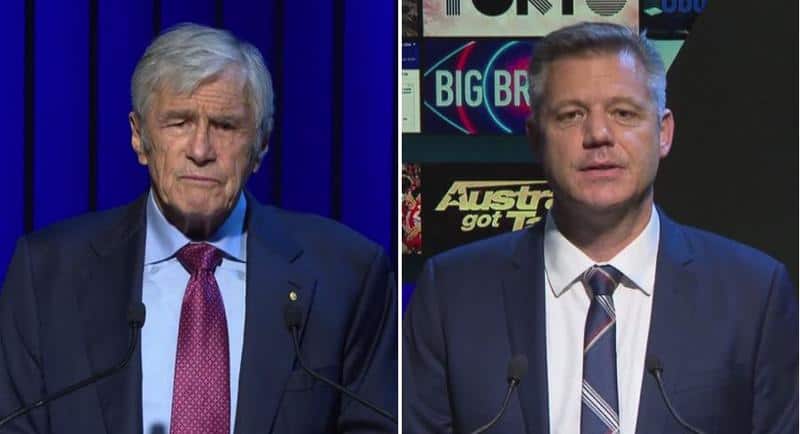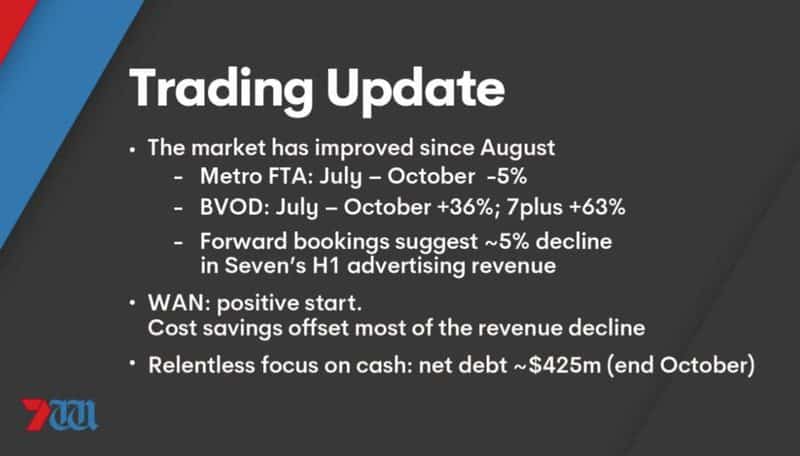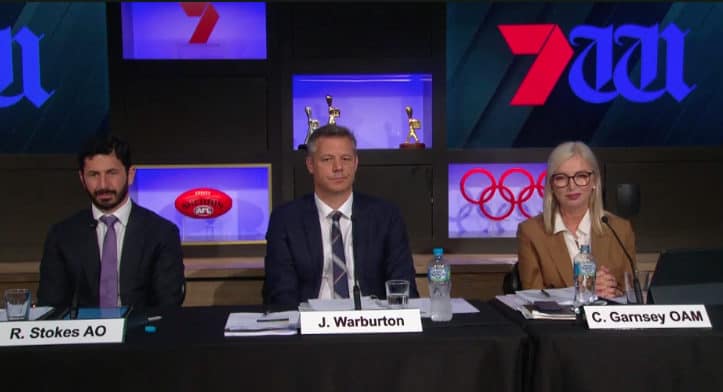Seven West Media chairman Kerry Stokes and CEO James Warburton spoke at the AGM yesterday and confirmed the Seven strategy outlined by Warburton at the recent 2021 Upfronts.
Both made short presentations and Stokes fielded a number of shareholder questions from the value of the shares to editorial questions about The West Australian.

Kerry Stokes and James Warburton
“The meeting marks the end of what has been the most tumultuous year in history for Seven West Media, the rest of the media sector and global economy as the Covid-19 pandemic impacted all of us,” said Stokes.
The chairman detailed how the initial plan he and Warburton signed off on in late 2019 was disrupted first by bushfires and then Covid.
“The unprecedented set of difficult economic conditions flowing from the pandemic brought more urgency to our plans to reinvigorate the group and we had to make very difficult decisions to shore up our business to withstand the economic shocks.
“This work continues with the divestment of non-core assets, a sharper focus on our cost structure, a refreshed programming schedule and content across all of our platforms.
“Sadly the cost-cutting has resulted in the departure of many valued staff who have made significant contributions to the group over many years. They have our greatest respect and we wish them well in the future.”
“Our management team are preparing a very exciting programming schedule for 2021, have successfully re-negotiated our rights contracts in AFL and horse racing, with other sports and programming contracts identified for new arrangements.
“We believe these measures and others being put in place will put Seven in a long-term winning position, and we are best placed to be the first and strongest to recover from the current difficulties.”
Stokes on Zempilas and climate change at The West
Kerry Stokes was re-elected to the board, however in answer to a shareholder’s question he indicated the Seven West Media board could appoint an independent chairman at some time.
In answers to other questions, Stokes re-affirmed Seven wanted to keep the cricket and that building profits will be the key to improving shareholder value. Stokes denied that Basil Zempilas got preferential treatment from The West Australian during the election campaign for Perth Lord Mayor and he said neither The West Australia nor Seven were climate change deniers.
Warburton on how things started to improve – quickly
When James Warburton spoke he again outlined the moves made when he arrived:
“Fifteen months ago, we were in a tough spot. Our primetime television schedule was tired, stagnant and stale. Revenue in our core offerings was in decline. Cost reductions weren’t keeping pace with revenue, and we were stuck with uneconomic sporting contracts. Seven’s BVOD offering was a distant #2 and WAN’s digital offering was in the early stages of rollout. We were also hampered by significant debt levels.
“In August 2019, we embarked on a strategy to address all of these issues. The strategy had three pillars: content-led growth, transformation, and addressing our capital structure and exploring M&A.
“In FY20, we simplified the management structure of Seven West Media and appointed a new executive team.
We also made other transformative changes:
• We departed from our internal production strategy for key tentpole shows and launched a completely refreshed prime time line up which we believe clearly positions us to win
• We implemented $170 million of annualised gross cost saving initiatives, including the renegotiation and extension of the AFL contract
• We prioritised our digital strategy and reinvigorated our 7plus BVOD platform, securing the #1 position in about 12 months, and turbo-charged WAN’s digital subscription push
• And we secured proceeds of $150 million from the sale of assets to reduce debt.
“The reality of 2020 has turned out to be completely different. We thought our new tentpole programming strategy would take six months to come to fruition, but it’s not what happened.
“We had to delay filming of Home and Away. We weren’t expecting to lose the AFL for eight weeks. We weren’t expecting an Olympiad without the Olympics and Paralympics.
“We weren’t expecting that we would be forced to delay Holey Moley for six months or that we would lose Australia’s Got Talent entirely. It should be on air right now.
“Covid didn’t single us out, but it certainly affected us significantly more than it did our competitors.
“However, our new content-led growth strategy of outsourcing known and tried international formats kicked off in June this year and things started to change – quickly.
“We moved from almost five share points down in the first half to more than 2 points up in the second half, which is a remarkable turnaround in the TV business.
“The resurgence was led by our refreshed and rebooted Big Brother, coupled with the return of the AFL.
“Big Brother was a runaway success and we followed it up with a new version of Farmer Wants A Wife and now SAS Australia, which launched as the number one entertainment show in October. It’s been too long since Seven launched back-to-back hits, let alone three key new tentpole shows.”
Debt reduction: Active sale process underway
“The second strategic pillar focuses on the transformation of SWM and we have made significant progress in that area.
“In FY20 we delivered $170 million in permanent gross cost reduction initiatives across the business, with the majority of these savings to be realised in the 2021 financial year.
“Temporary savings initiatives of $51 million were actioned in March which helped limit the impact of Covid-19 on the business.
“The combined outcome of these savings has been transformational, resetting the business’s cost base, simplifying its structure, optimising processes, reducing headcount and addressing uneconomic contracts. We have started the transformation, but we are not finished. We’re targeting $30 to $50 million in further cost out initiatives in FY21 which will be incremental to the savings actioned in FY20.
“We have also made significant headway on our third pillar, capital structure and M&A. The total proceeds from asset sales in FY20 were $150 million, including the sale of Pacific Magazines.
“We have active sale processes underway with the proceeds to be used to work down debt. We’re at an advanced stage with those asset sales and will update the market in coming months.
“During the 2020 financial year we reduced net debt to $398 million, compared to $564 million at the end of FY19.”
Ad revenue down 5%, but holes in schedule fixed
Regarding a trading update, Warburton said: “We are confident that the slate we outlined at our upfront will ensure Seven is absolutely competitive in 2021 and beyond.
“Competitive content drives revenue. So far in FY21 we’ve seen strong revenue share performance when we’ve delivered engaging content. The holes in our schedule are fixed for 2021. When content works share follows, with each share point worth $22m per annum.
“The market has improved since the August results but remains short and volatile. The Metro FTA market was down 5% YoY for the period from July to October. Over the same period, the BVOD market continues to grow strongly, up 37%, with 7plus capturing share and growing 62% in that period.
“Forward bookings suggest Seven’s advertising revenue for the first half could be down approximately 5%.”

